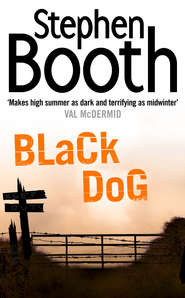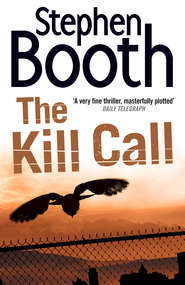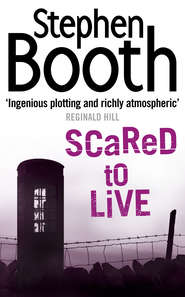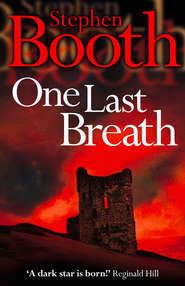По всем вопросам обращайтесь на: info@litportal.ru
(©) 2003-2024.
✖
Blind to the Bones
Автор
Год написания книги
2019
Настройки чтения
Размер шрифта
Высота строк
Поля
‘That was an old Volkswagen Beetle,’ said Norton.
‘How do you know that?’
‘I recognize the sound of the engine. It’s distinctive – air-cooled, you know. I used to have a Beetle myself years ago, when I was a lad.’
‘Have we finished with these rats, then?’
‘For now,’ said Norton. He turned off his torch. ‘You know, I wouldn’t like to walk through this tunnel in the dark.’
Cade shuddered. ‘Me neither. Three miles in the dark? No thanks. It’d be bad enough, even without the rats.’
He turned back towards their van. But Norton didn’t follow him immediately. He was looking up at the stones over the arch of the tunnel mouth. He’d once been told that the navvies who built the old tunnels had been very superstitious men. They were convinced that their tunnelling had disturbed something deep in the hill, which had been the cause of all the disasters that happened to them – the tragedies that had earned Woodhead the nickname ‘Railwaymen’s Graveyard’. Norton had heard that when the navvies had finished tunnelling, their final act had been to carve faces at each of the tunnel entrances to control the evil spirits. But if the carvings were still there, they were so worn now that he couldn’t make them out.
Sandy Norton shrugged. He didn’t know about evil spirits. But the faces hadn’t done much to control the rats.
Finally, he locked the steel gate that prevented unauthorized access to the middle tunnel. All three tunnels had their own gates. Without them, rail enthusiasts and others who were even less welcome would always be trying to get into the tunnels. Some of those folk would want to walk all three miles to the other end, just to prove they could do it. They wouldn’t be bothered by the rats. They wouldn’t take any notice of the risk from the high-voltage power cables. They wouldn’t even be deterred by the National Grid’s yellow-and-black signs on the gates. The meaning of the signs was clear enough, with their symbol of a black lightning bolt cutting through a body. It was clear even without their message, which read: ‘Danger of Death’.
Whenever the phone rang in the Old Rectory, Sarah Renshaw stopped what she was doing and looked at the nearest clock. It would be important to have the exact time, when the moment came.
She was in the sitting room, where the mahogany wall clock said five minutes past ten. Sarah checked her watch, and adjusted the minute hand slightly so that it read the same. She didn’t want there to be any confusion. All the times were important – the time Emma had last been seen, the time her train had left Wolverhampton, the time she should have arrived home. And the exact minute they got news that she had been found would be vital. Sarah felt comforted by the recording of the minutes. It was more than a ritual. Time was important.
Howard had gone to answer the phone, so Sarah waited. In the middle of their big oak Jacobean sideboard, a candle was burning. The wick was already halfway down, and the melted wax was pooling in the brass holder. There were plenty more candles in one of the drawers, and Sarah wanted to light a new one right away to mark the moment, as if the act itself would make a difference. But she hugged her hands under her armpits and restrained herself as she listened to Howard speaking in the next room. She would be able to tell by the tone of his voice.
Sarah looked at the clock again. Six minutes past ten. For a moment, she panicked. Which would be most important – the exact time the phone had rung, or the moment she had got the news? Which would she celebrate, in the years to come?
‘Howard?’ she called. ‘Howard?’
But he didn’t respond, and Sarah quickly calmed again. Howard’s voice was subdued. If the call had been about Emma, she would have known it by now. The news would have communicated itself to her through the wall. Sarah had often thought that the call, when it came, wouldn’t produce any normal-sounding ring on their phone, but would announce itself like a fanfare. She vaguely imagined a line of liveried trumpeters like those who appeared with the Queen at state occasions. Her ears already rang to the sound they made.
And certainly there would be the sensations – the tingling and the little quivers of pleasure that she experienced whenever she felt that Emma was close by. When the call came, she expected a jolt like a great charge of electricity, like the entire four hundred thousand volts from the cables that ran through the hillside two hundred feet below their house.
Yes, when the phone call came, she would know. Sarah would have no need to listen to the sound of Howard’s voice, or to hear what the person at the other end of the line was saying. The fanfare would sound, and the electricity would surge through her body, stinging her hands and burning the skin of her face. And the mahogany wall clock would stop of its own accord at the exact moment, at the precise second and micro second, and it would never start again. Sarah would know.
Howard came into the sitting room, instantly dominating it with his bulk. He was wearing a thick, white Arran sweater that made her want to wrap her arms round him and bury her face in the wool. But he shook his head briefly, and averted his eyes.
Sarah had been standing at the bookcase near the door. She ran her hand along some of the spines, and touched a folded and dog-eared piece of paper that had been used to mark a page in Twentieth-Century Design. She tried to breathe in the scent of the books, but the familiar smells of paper and ink seemed fainter tonight. Subjects and Symbols in Art had a small stain on the cover that had almost faded now because Sarah had touched it too often. She took out Art Deco Graphics and a David Hockney book, and put them back the other way round.
Many of the books were inscribed in Emma’s own handwriting on the title page. She had only put her name and the date, but the inscriptions seemed to offer a sort of continuity, a narrative reflecting a particular period in Emma’s life.
These were the books Emma had once handled and read, which meant that the words on their pages must have entered her mind and become part of her. Sarah was able to pick up a book that Emma had once opened, and read the words that Emma had studied.
Sarah Renshaw often found herself spending time rearranging the books. Perhaps by shuffling the dates on the books, she could change the order of events in Emma’s life. If she had read this book before that one, might things have been different? Would Emma have been at home now, complaining that her mum was messing up the order of her books?
Sarah wiped a tear from her eye. She caught herself just before she spoke aloud, and dropped her voice to a whisper, so that Howard wouldn’t hear her.
‘I’ll help you put them back exactly how you want them, dear. We’ll do it together.’
Sarah turned away from the bookcase and took down a calendar from the top of the TV set. She crossed off another day, neatly deleting it with two short, sharp strokes of a black marker pen.
It was Day 743. Emma Renshaw had been missing for over two years.
Now the laughter in the village had subsided, or the woman making the noise had moved out of earshot. Derek Alton stood in his church porch and listened to the sound of Neil Granger’s car engine as it moved slowly out of Withens. It climbed the road away from the village and began to cross the miles of bare moorland towards the valley of Longdendale.
Finally, even the sound of the engine disappeared behind the hill. The blackbirds settled into the yew trees, Alton’s breathing returned to normal. And as it grew dark, Withens became almost entirely silent. Except for the screaming.
2 (#ulink_31ac2506-7384-5958-a2ce-681c49aa1d6e)
Saturday
With a heave of his shoulders, a police officer in body armour swung the battering ram. The door split at the first impact. He swung a few more times, and the thump of steel hitting wood wrecked the stillness of the early morning. A burglar alarm began to shriek as the lock shattered, and the officer gave the door a kick with his boot.
Standing in the damp bracken at the edge of the road, Detective Constable Ben Cooper watched officers wearing Kevlar vests burst into the house as their team leader began to shout instructions. The door had given way a bit too easily, he thought. Maybe the householder should have spent more money on security, and less on the plate glass and patios.
‘Well, they give the impression of people with nothing to hide,’ he said. ‘But God knows what all that glass does to their heating bill.’
Cooper could feel a fine rain in the air, like feathers touching his face. Sunlight and showers were passing across the hills so quickly that it was almost dizzying. Though he was standing still, he seemed to be moving from darkness into light and back again, as the clouds obscured the sun, showered him with rain and were blown westwards by the wind. The raindrops hardly had a chance to dry on his waxed coat before the next bank of clouds reached him.
For some reason, PC Tracy Udall was wearing her body armour, too. No doubt it was a sensible precaution, but it looked a bit odd when the most dangerous thing in sight was a patch of stinging nettles. Besides, she seemed to Cooper like a candidate for a breast reduction operation to make the vest fit properly.
For the moment, PC Udall had left her yellow waterproof jacket in the car. But the banks of darker clouds rapidly moving towards them from the east suggested that she might regret moving too far away from the car without it.
‘If we’re right about their source of income, they won’t be worrying about sharing a bit of it with Powergen,’ she said.
He wiped the rain off his binoculars so that he could study the house more carefully. It had been a farmhouse at one time, but part of the side wall had been taken out and replaced with floor-to-ceiling glass, which must let more light in than had ever been seen by several generations of Derbyshire hill-farming families. There was new glass at the back too, and dormer windows had been built into the stone-tiled roof.
The room he could see through the glass had a floor made from patterned blocks of light-coloured wood, where once there would surely have been stone flags. There was a glimpse of light from another window way down at the far end. That could only mean that an internal wall had been removed to create one large room running right through to the back of the house. An estate agent would probably call it an open-plan living space.
As they had descended into the valley, the police team had been careful not to disturb the dawn with the lights of their beacons and the wail of their sirens. But now the time for discretion had passed. On the way to the raid, one of the task force officers had joked that they’d need to get inside the house quickly to be out of the rain. Kevlar fibres were known to deteriorate if they got wet. Also if they were exposed to direct sunlight. That was why police officers in body armour never went out in sunlight, or so they said. But at least it provided a lot more protection than if you had left it hanging in your locker at the station.
A few hundred yards beyond the target house was another cluster of roofs, including a number of old farm buildings, one of which had been converted into a double garage. But there was also a four-wheel-drive vehicle standing on the brick-paved driveway – a Toyota or a Mitsubishi, he couldn’t quite be sure from this distance. As he watched, a large, shaggy-haired dog wandered into sight, sniffed at the vehicle’s front near-side tyre, looked over its shoulder guiltily, and slunk off towards the back of the house. There was a paddock at the side of the driveway, newly fenced and containing a Shetland pony, a Jacob sheep and two Muscovy ducks.
‘What about the neighbours?’ said Cooper.
‘Well, the house actually belongs to an architect,’ said Udall. ‘Apparently, he’s employed by the Cooperative Society, and he designs grocery shops and crematoria for a living.’
Udall had an air of briskness that Cooper liked. In the car on the way from Glossop section station, she told him that she’d been in the force ten years. She was a single mother, and had joined up after her youngest child was old enough to attend nursery school. When she had been on the wrong shifts – which she usually was, she said – her mother had collected the children from school. Now her son was thirteen, and she was starting to get worried about him.
‘Grocery shops and crematoria?’
‘Or, as Sergeant Boyce puts it, “rashers to ashes”. He’s a scream.’
‘Every team needs a comedian.’
‘But the architect is working abroad. Somewhere in the Gulf States, I think. So he leased the house for a couple of years. The present occupier also has an address in South Manchester, where his neighbours say he’s a motor dealer.’
One of those brief, unnerving silences had developed down at the house. The officers waiting outside checked their earpieces. These moments never lasted long, but they were worse than any amount of overexcited shouting over the airwaves.
Cooper looked at the unused farm buildings and thought of his brother Matt, struggling more than ever now to support his family on the income from Bridge End Farm. Revenue from livestock farming had plummeted, and not just because of the aftermath of the foot-and-mouth outbreak. Farmers like Matt lived on a knife edge, wondering when the bank would pull the plug on their overdraft. There were some advantages to a regular salary from Derbyshire Constabulary, after all.











